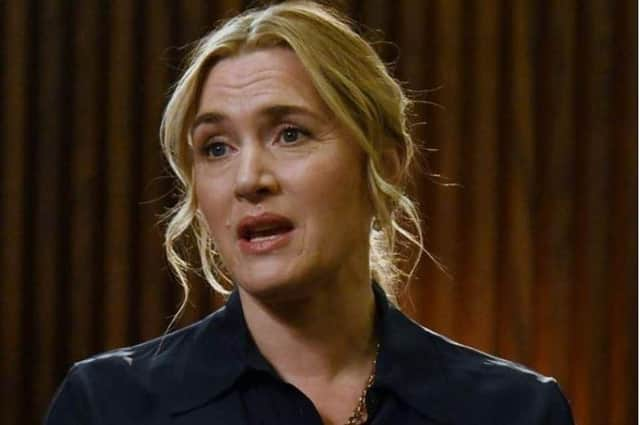BAFTA glory for West Sussex-based actress Kate Winslet for I Am Ruth


Winslet, who lives near Chichester, won best leading actress for the Channel 4 film. When it was released late last year, Winslet called for stronger protection for children using the internet. The piece was created by BAFTA winning filmmaker Dominic Savage.
Its fictional storyline was developed and co-authored by Dominic Savage and Kate Winslet, who promised “a story for our times about the endemic mental health crisis affecting young people.”
Advertisement
Hide AdAdvertisement
Hide AdThe film promised an honest authentic portrayal of a mother and daughter’s increasingly strained relationship. Winslet starred as Ruth, a loving and concerned mother who witnesses her teenage daughter Freya (her real-life daughter Mia Threapleton) retreating into herself as she becomes more and more consumed by the pressures of social media.
When it came out, Winslet told the BBC there should be age blocks for social media sites to improve protection for children using the internet. She told the BBC's Laura Kuenssberg that security checks could also be more rigorous and those in power "should step up" to protect children.
She also told The Daily Telegraph “In our sexualised society, it’s horrifying what children can access online.” She added: “It's a very, very difficult time to raise teenagers’:
In the film Freya posts sexual images of herself on social media, then is distraught at the comments they attract. Winslet told The Daily Telegraph: “We are growing up in a much more sexualised society. It’s horrifying what children can access online these days. What upsets me most are the ideas that are being fed to young boys and young men about what women’s bodies actually look like. Because so much of that is inaccurate. So women are automatically feeling judged or insecure, or scrutinised.”
Advertisement
Hide AdAdvertisement
Hide AdOf the drama, Winslet, in a Channel 4 release, said: “Ruth is a mother living in a sweet suburban sort of middle-class house with a very ordinary life, that she just ticks along and things are kind of fine. She has two children, Billy and Freya. Billy has gone away to university.
“What we really wanted to do with this was to set this story in a world that often isn’t necessarily known in television narratives for underlining some of the issues that we wanted to underline. Our story focuses on the crumbling relationship between Ruth and her daughter Freya, who is 17 and who has been retreating further and further into herself. She is not communicating with her mother, not even functioning in a very basic way in daily life, in a way that is familiar to Ruth. Her child is changing by the day before her eyes and she can’t reach her, and she feels very out of touch, and she can see that her daughter is suffering and is very lost.
“Ruth's instinct as a mother is to try and help her and to stop whatever is going on and she can sense that there is some deceit and lying happening. What is actually going on at the heart of our story is that her daughter has formed a really destructive addiction to social media and Ruth kind of knows it. Ruth stops it by intervening, by getting into her phone, and by pointing out to her that this is what is harming her. And through that process there is a healing that hopefully starts to begin for this mother and child, particularly for this child. Everyone knows that social media, whilst it can be a positive thing for some, for other teenagers it can completely consume their worlds and not necessarily in positive ways. We just wanted to tell a story that was honest and highlighted those issues that are so extraordinarily prevalent at the moment, and alarmingly so.”
Winslet told Channel 4: “I want audiences to take away from this a sense of empathy for their own situations. That’s what we’ve wanted to do, to shine a light on something that is endemic amongst teenagers at the moment. Almost every parent of teenagers that I speak to say “oh gosh, these phones, and the social media, how do you stop them doing it?”. Parents are absolutely at a loss as to know how to control, help, create boundaries around it - do they have it, do they not have it, how do you stop it? People just don’t know what to do. And so I think telling a story that covers all of these things, and some of it is very very tough, hopefully gives people an opportunity to put their hand up and say “that’s us, that’s me, that’s happening to me and actually if that’s extreme then so is oursituation, any maybe we need to try and not be afraid to fix it”. That is what I hope they take away.
Advertisement
Hide AdAdvertisement
Hide Ad“In our early conversations, Dominic wanted to know things that had either happened in my life or things that I had hoped to highlight in a creative capacity but had never had the opportunity to necessarily do so. Likewise, he was interested to know whether there was a particular type of role that I had always wanted to play. Through a sort of amalgamation of all of those conversations, we came up with a story that was based on some shared ideas and also concerns that we both have as parents around addictions that can be formed to social media - and that was really how it began.”